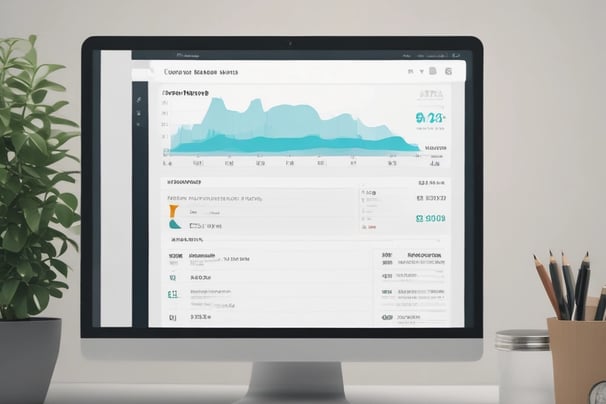Top Tips for Managing Your Finances as a Solopreneur
Learn the top tips for managing your finances as a solopreneur, from budgeting to tax planning, to ensure your business’s financial health and success.
BUSINESS TIPS
2/5/20254 min read


As a solopreneur, managing your finances is one of the most important aspects of running a successful business. Whether you're a freelancer, an online entrepreneur, or a small business owner, staying on top of your finances can be challenging. But don’t worry! With the right tools, strategies, and mindset, managing your money as a solopreneur can become second nature.
In this blog post, we'll cover the essential tips for managing your finances as a solopreneur to ensure your business remains profitable and sustainable. From budgeting to tax planning, these strategies will help you gain control over your financial health. Let's dive in!
1. Start with a Solid Business Budget
As a solopreneur, it’s crucial to have a clear understanding of your business income and expenses. A well-structured budget will help you make informed decisions and avoid financial pitfalls.
Why Budgeting Matters:
Track income and expenses: A solid budget helps you understand where your money is coming from and where it's going.
Control cash flow: Managing your budget ensures that you have enough funds to cover business expenses and personal costs without running into cash flow issues.
Achieve goals: With a budget, you can allocate money toward business growth, savings, or paying down debt.
Tip: Start by categorizing your expenses into fixed costs (like software subscriptions and office supplies) and variable costs (like marketing or client entertainment). This will give you a clearer picture of your financial needs.
2. Separate Personal and Business Finances
One of the biggest mistakes many solopreneurs make is mixing personal and business finances. This can lead to confusion, missed tax deductions, and even legal trouble.
How to Separate Finances:
Open a business bank account: Having a dedicated business account makes tracking and managing expenses easier.
Get a business credit card: This helps you separate business purchases from personal ones, making it easier to track deductions.
Use accounting software: Tools like QuickBooks or Wave can automatically categorize transactions, so you don’t have to worry about sifting through statements at the end of the month.
3. Plan for Taxes
Tax planning is essential for solopreneurs, as you're responsible for managing your own tax payments. It’s easy to overlook taxes when you're focused on building your business, but failing to plan can result in a hefty tax bill come filing time.
Key Tax Considerations:
Set aside money for taxes: A good rule of thumb is to set aside at least 25% of your income for taxes, but the exact percentage may vary depending on your location and income.
Track deductible expenses: As a business owner, you may qualify for deductions like home office expenses, travel, and business-related meals. Keep records of all your expenses to reduce your taxable income.
Hire a tax professional: Tax laws can be complex, so it’s worth investing in a professional to help you maximize deductions and stay compliant.
4. Monitor Cash Flow Regularly
Managing cash flow is key to running a successful solopreneur business. You can be profitable on paper but still run into trouble if cash is not flowing in regularly.
How to Monitor Cash Flow:
Use accounting tools: Tools like Xero or FreshBooks allow you to track incoming payments and outstanding invoices, so you can stay on top of your cash flow.
Keep an emergency fund: Ideally, aim to have three to six months of operating expenses saved in case of unexpected business disruptions.
Invoice promptly: Don’t delay sending invoices! The sooner you bill clients, the sooner you can get paid. Implementing payment terms (like 30 days) can help manage expectations.
5. Set Financial Goals
Just as you set business goals, you should also set financial goals for your solopreneur business. Financial goals help you stay motivated and focused on your business growth while managing expenses and saving for future growth.
Examples of Financial Goals:
Increase profits by X% within six months
Save for a business expansion or new product launch
Pay down debt or reduce business-related expenses
Make your financial goals SMART (Specific, Measurable, Achievable, Relevant, and Time-bound) to increase your chances of success. For example, “Save $2,000 for marketing within the next quarter” is a specific goal that’s easier to track.


6. Automate Your Finances
As a solopreneur, you’re likely wearing many hats. Automating your financial processes can save you time and reduce the likelihood of making mistakes.
Tools for Automation:
Automate savings: Set up automatic transfers to savings or investment accounts to ensure you're building wealth and setting aside funds for growth.
Schedule recurring payments: Automate monthly bills like subscriptions or software fees to avoid missing payments.
Set reminders for taxes and payments: Use your accounting software or set calendar reminders for important financial deadlines, including tax filing dates and quarterly estimated tax payments.
7. Track and Analyze Your Expenses
One of the best ways to manage your finances as a solopreneur is to track your expenses and analyze them regularly. This allows you to identify areas where you can cut costs or reallocate funds to more profitable areas.
How to Track Expenses:
Use expense tracking apps: Tools like Expensify or Mint make it easy to categorize and track your spending.
Review your expenses monthly: At the end of each month, review your budget and see if you're sticking to your financial plan.
Look for patterns: Identify any unnecessary or recurring expenses that you can cut. For example, are you paying for software you’re not using?
8. Protect Your Business with Insurance
While it might seem like an unnecessary expense, having the right insurance in place is crucial for protecting your business and finances. Depending on the type of business you run, there are various insurance options available, such as liability insurance or business interruption insurance.
Types of Business Insurance to Consider:
General liability insurance for protection against lawsuits.
Professional liability insurance for service-based businesses.
Health insurance if you're a solopreneur working full-time.
Conclusion: Take Control of Your Financial Future
Managing your finances as a solopreneur is both challenging and rewarding. By implementing these strategies, you can take control of your finances, reduce stress, and set your business up for long-term success. Whether you’re just starting out or looking to refine your financial habits, it’s important to stay organized, stay disciplined, and keep learning.
Take Action: Ready to take control of your finances? Start by setting up a budget, separating your personal and business finances, and automating your payments. Download our Business Budget Tracker to get started today!


TL Creative Studio
TL Creative Studio specializes in digital planners, eBooks, and PLR products, empowering entrepreneur and women to boost productivity, achieve goals, and earn from home. Your hub for planning and success!
stay updated
© 2024. All rights reserved.
